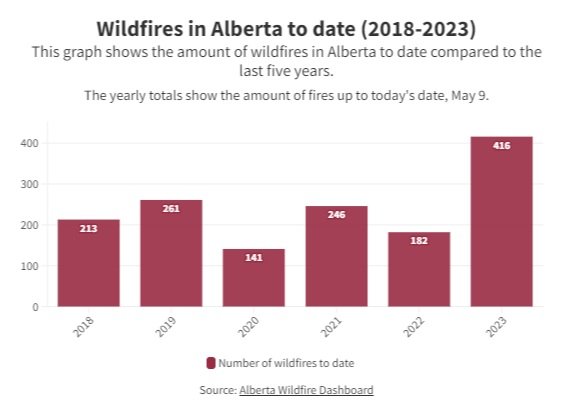In the face of recent wildfire tragedies that have impacted our beautiful province, we extend our heartfelt empathy and support to you. We understand the challenges you may be facing and want to provide guidance on how to navigate the effects of the wildfires on your businesses, as well as offer insights on recovery strategies.
The Effects of Wildfires on Entrepreneurs:
1.1 Physical and Emotional Challenges:
The devastation caused by wildfires can lead to significant physical and emotional challenges for entrepreneurs. Loss of property, disruption of operations, and the emotional toll of witnessing the destruction of the communities we hold dear can be overwhelming. It is essential to prioritize self-care and support networks during these difficult times. During and after wildfires, customers and employees may have concerns about safety, air quality, and the viability of doing business in affected areas. These concerns can impact customer footfall, employee morale, and overall business confidence.
1.2 Disruption of Operations:
Wildfires can disrupt the day-to-day operations of businesses, forcing temporary closures or reduced productivity. Evacuations, power outages, and transportation issues can make it difficult to serve customers or fulfill orders. The sudden drop in revenue can create financial strain and uncertainty for entrepreneurs. Wildfires can, in particular, disrupt various industries, including agriculture, forestry, tourism, and outdoor recreation. Damage to crops, forests, and tourism infrastructure can lead to reduced productivity, job losses, and decreased revenue for businesses in these sectors, especially those who rely on a busy summer season.
1.3 Property and Infrastructure Damage:
Wildfires can cause significant damage to residential and commercial properties, as well as critical infrastructure such as roads, power lines, and water systems. Rebuilding and repairing these assets can impose a heavy financial burden on affected communities.
1.4 Health Impacts:
Wildfire smoke can have adverse health effects, leading to increased healthcare costs. Communities affected by wildfires may experience higher rates of respiratory illnesses, allergies, and other related health issues, requiring increased medical attention and healthcare resources.
1.5 Long-Term Environmental Consequences:
Wildfires can result in long-term ecological damage, affecting ecosystems, biodiversity, and water quality. The loss of natural resources and the need for habitat restoration can have indirect economic impacts, such as reduced availability of timber for forestry operations or reduced attractiveness for outdoor tourism activities.
2. Economic Implications of Wildfires:
2.1 Property and Infrastructure Damage:
The economic toll of wildfires is significant. The destruction of residential and commercial properties, along with critical infrastructure, can require substantial investments in rebuilding and repairs. Entrepreneurs may face financial burdens in restoring their businesses and may need to seek assistance or secure additional funding.
2.2 Disruption to Industries:
Wildfires can disrupt various industries crucial to Alberta's economy, such as agriculture, forestry, tourism, and outdoor recreation. Crop and forest damage, closure of tourist attractions, and decreased visitor numbers can lead to reduced productivity, job losses, and decreased revenue for businesses in these sectors.
2.3 Insurance Costs and Premiums:
Following wildfires, insurance costs may increase for entrepreneurs in affected regions. Insurance providers may adjust premiums to reflect the heightened risk of future wildfires, impacting the affordability of coverage for businesses. It is essential to review insurance policies and explore options with knowledgeable professionals to ensure adequate coverage.
2.4 Government Expenditures:
Governments at different levels allocate significant funds for firefighting efforts, emergency response, and recovery programs. These expenditures can strain public budgets, diverting funds that could have been allocated to other priorities. However, government support programs may also be available to assist entrepreneurs in their recovery journey.
3. Recovery Strategies for Alberta Entrepreneurs:
3.1 Business Continuity Planning:
Developing a comprehensive business continuity plan is crucial to navigate through wildfire disasters. Such a plan should include evacuation protocols, remote work arrangements, alternate supply chain options, and communication strategies to keep stakeholders informed.
3.2 Communication and Stakeholder Engagement:
Maintaining open communication with employees, customers, suppliers, and other stakeholders is essential during and after wildfires. Be transparent about your business's status, any operational changes, and safety precautions taken. Regular updates and reassurances can help build trust and loyalty.
3.3 Financial Assessment and Support:
Conduct a thorough financial assessment of your business to gauge the extent of the wildfire's impact on revenue, cash flow, and profitability. Seek expert advice to explore financial support options, including government grants, low-interest loans, and community initiatives designed to aid business recovery.
3.4 Employee Support and Well-being:
Supporting your employees' physical and emotional well-being is paramount. Offer resources such as counseling services, flexible work arrangements, or access to community support networks. Remember, a healthy and motivated team is crucial for business resilience and recovery.
3.5 Diversification and Adaptation:
Consider diversifying your business offerings or expanding into new markets to mitigate the effects of wildfires on your revenue streams. Adapt your products or services to cater to changing customer needs or tap into emerging opportunities arising from recovery efforts.
3.6 Collaborative Networking:
Engage with other entrepreneurs and community organizations to collaborate, share resources, and support one another. By pooling knowledge, skills, and networks, you can collectively overcome challenges and enhance the recovery process for all.
Alberta, we stand with you during this challenging time. While wildfires have had a profound impact on our businesses and communities, our resilience and determination will guide us toward recovery. By prioritizing self-care, implementing recovery strategies, and leveraging available support systems, we can navigate through the aftermath of wildfires and rebuild stronger, more sustainable businesses.
Remember, you are not alone. Reach out to local business associations, support organizations, and fellow entrepreneurs for guidance and assistance. Together, we can overcome these challenges and emerge stronger, reaffirming the indomitable spirit of Alberta entrepreneurship.
Wishing you strength, perseverance, and success on your journey to recovery. Please reach out to info@awebusiness.com if you need any business advising unique to your business, and don’t forget to visit our webinars here to join a group advising session. Our Emergency Planning is also linked here.
To Apply for the Alberta Financial Aid for Wildfire Evacuees apply here.
Starting May 9th, any Albertan that was evacuated due to wildfires for 7 days or more can apply for a 1-time emergency evacuation payment. Eligible evacuees will receive $1250 per adult and an additional $500 per child under the age of 18. Families of 4 can receive $3500. Payments to evacuees will be made by e-transfer.
Stay up to date on the status and latest data on the wildfires here.









